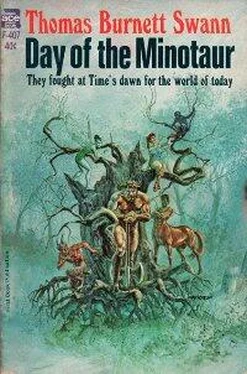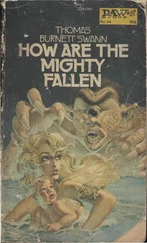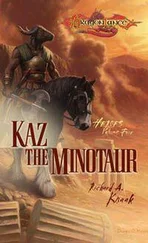Thomas Swann - Day of the Minotaur
Здесь есть возможность читать онлайн «Thomas Swann - Day of the Minotaur» весь текст электронной книги совершенно бесплатно (целиком полную версию без сокращений). В некоторых случаях можно слушать аудио, скачать через торрент в формате fb2 и присутствует краткое содержание. Год выпуска: 1966, Издательство: Ace Books, Жанр: Фэнтези, на английском языке. Описание произведения, (предисловие) а так же отзывы посетителей доступны на портале библиотеки ЛибКат.
- Название:Day of the Minotaur
- Автор:
- Издательство:Ace Books
- Жанр:
- Год:1966
- ISBN:нет данных
- Рейтинг книги:5 / 5. Голосов: 1
-
Избранное:Добавить в избранное
- Отзывы:
-
Ваша оценка:
- 100
- 1
- 2
- 3
- 4
- 5
Day of the Minotaur: краткое содержание, описание и аннотация
Предлагаем к чтению аннотацию, описание, краткое содержание или предисловие (зависит от того, что написал сам автор книги «Day of the Minotaur»). Если вы не нашли необходимую информацию о книге — напишите в комментариях, мы постараемся отыскать её.
Day of the Minotaur — читать онлайн бесплатно полную книгу (весь текст) целиком
Ниже представлен текст книги, разбитый по страницам. Система сохранения места последней прочитанной страницы, позволяет с удобством читать онлайн бесплатно книгу «Day of the Minotaur», без необходимости каждый раз заново искать на чём Вы остановились. Поставьте закладку, и сможете в любой момент перейти на страницу, на которой закончили чтение.
Интервал:
Закладка:
“My turn,” I called.
Restraining fingers caught at my belt. “Mine,” said Thea.
“I’ll step on your toes,” I protested, edging toward Zoe.
“Not in my dance.” Her fingers were irresistible. “We call it the Walk of the Cranes.” We linked hands and she led me through stately, meandering steps like those of the young virgins when they dance beside the River Kairatos, though the music seemed more appropriate to the opium-drugged priestesses of the Great Mother, when they yield themselves to ecstasy, writhe on the ground, and tear the bark from a tree with their savage teeth.
“Your friends are very”—she paused to select a word—“exuberant. I’m afraid they will tire my brother.”
“He seems to be holding his own,” I observed as the boy and his partner, her capacious bulk grown seemingly weightless, mimicked snakes on the ground and birds in the air, leaped with exultant cries of “ Evoe! Evoe!”
“Eunostos,” she said. “Do you like my dance?”
“Well, it has dignity.”
“Yes, but sometimes you men seem to like something more animalistic.” A wistfulness softened her voice. She looked even less than her sixteen years, a very young girl whose knowledge of men was limited to a father, a brother, and a few palace retainers. I tightened my grip on her hand.
“I think,” she said sadly, “that most men like innocence only because it challenges them to change it into experience.”
“Physical innocence, yes,” I said. “That we like to change —after all it is merely ignorance. But the innocence of the heart—that is as rare as the black pearls from the land of the Yellow Men, and no honorable Beast wishes to threaten it, any more than he would drop a pearl in a glass of wine ind watch it dissolve.”
“But the body encloses the heart. When the body falls, what dignity is left to the heart?”
“None, when the body falls; but when it is given, like a proud city to a noble king, then it grows rich—then it enriches the heart.”
Against the feverish background of the flute, our shouted words seemed strangely impersonal, strangely divorced from the girl and Beast who spoke them. When the music ended, our words faltered in the great silence.
“That’s all,” said Moschus, wiping his lips and returning the flute to his wolfskin sash. “Musician wants a drink.” But he came at Thea with a thirst which was not for beer.
She disengaged her hand and hurried up the stairs toward the garden and the oven.
Moschus glared after her. “Skittish colt, eh, Eunostos?”
She returned with a heaping aviary of cakes in the form of owls, woodpeckers, swallows, eagles, and partridges, whose piquant scents enwrearhed the platter and titillated our nostrils. She was justly proud of her baking.
“Not for me, honey,” said Zoe, heading for the beer. “I don’t eat while I’m drinking. Spoils the kick.”
“Same here,” said Moschus, slapping Zoe’s flank.
Thea’s smile vanished. Her one contribution to the party was being ignored. “Pandia?” she asked doubtfully. Pandia sprang to her feet and converged on the birds, scooping them into her mouth so quickly that they seemed to flutter from the plate.
“You see why I don’t drink,” she said as she licked the last crumbs from her stubby hands (paws, should I say?). “It would waterlog the food.”
Now the drinking began in earnest. Six times I had to replenish the skin, while Thea followed me, mopping the beer which trickled onto the floor. Moschus watched her and brooded over what he whispered was youth’s lack of appreciation for mature years. “She treats me like an old dray,” he muttered . Icarus rested his head in Zoe’s lap; with one hand, she trickled beer down his throat from a rhyton shaped like a bull, with the other she stroked his pointed ears.
“Sly little Beast,” she said in a hoarse whisper. “Why did you take so long to come back to the forest?”
Between swallows he raised his head and caught Pandia’s eye. “All right, Pandy?” he called.
Pandia nodded vehemently. She had the look of a child who has caught her parents drinking, but there was no disapproval in the wide, watchful eyes; there was expectation of further excesses.
An increasingly nervous host, I alternated between swigs of beer and anxious looks at Thea, whose expression was dire enough to dismay a Gorgan. Suddenly I felt defiant. It was my house and my friends, and she had no right to mistake our good-natured mischief for misbehaving. A little horseplay on the part of Moschus; Zoe expansively maternal but hardly wanton; Icarus enjoying himself and Pandia enjoying the view. What was the harm in that? I sat down on the rug beside Zoe and twined an arm around the hill of her shoulders. Without displacing Icarus, she lent me the arm with which she had stroked his ears.
“Moschus, there’s room for you too,” she called with perhaps excessive optimism.
“Thea,” I bellowed. “Fetch us some more beer! Your guests are thirsty.”
A cold streamer of beer swatted me across the mouth.
“You’re drunk,” snapped Thea, “and so is Icarus,” and, turning to Zoe: “You’re to blame!”
Zoe’s voice was relaxed. “Dear, your brother is fifteen and it’s time he learned to hold his liquor. As for Eunostos, he’s hardly begun to drink. You ought to see him after another skin!” She gave a body-wrenching sigh. “However, I expect it’s time to go. It’s a long way to my tree, and there are Striges out at night, to say nothing of those thieving Thriae.” Still unhurried, with the slow deliberate movements of a mother placing her baby in a crib, she lifted Icarus’ head from her lap and cradled it on a cushion.
He looked up at her with sleepy disappointment. “Your lap was softer.”
She winked. “Boy, when you want a lap instead of a cushion, come to my tree. It’s a royal oak. Eunostos knows the way!”
I saw them up the stairs and across the garden. The silver palm of the fountain swayed in the moonlight; the crude parasol stood like the silk pavilion of an Eastern king; and even the homely oven looked dim and mysterious, fit for incense instead of bread. But the headless stalks of my poppies made me sad, in spite of the moon and its white, ennobling foam.
“Zoe,” I said. “Moschus. You will have to forgive her. She isn’t used to our ways.”
“You think that’s it?” Zoe smiled. “Inexperience, innocence, and all that? I would have said she was jealous.”
“Of Icarus?”
“Of you.”
Chapter V
KORA
I awoke to singing. The singer was Thea in the garden, and her song was about a tiger moth:
His heart is dappled like his wing:
Day-yellow spilled with night.
The tiger-part loves evening,
The moth-part, candlelight.
I disentangled myself from a pile of wolfskins, yawned mightily, and climbed the stairs to investigate her high spirits.
In the garden she was pulling my last carrots out of their earthen burrows. I winced. Of course they were grown to be eaten, but after the decapitation of my poppies, I resented any diminishment of my shrunken plot. Blue monkeys had lined the walls to watch her, and one bold fellow had skittered onto the ground to receive a carrot. I glared at his boldness but only managed to increase his appetite.
She climbed to her feet and smiled. “We’re going on a picnic. I’m getting our lunch ready now.”
“What should I wear?” I asked. I had not taken time to dress.
“You are dressed exactly right,” she said. “Picnics should be informal.”
With a lunch of hard-boiled woodpecker eggs, roasted chestnuts, wolf’s milk cheese, raw carrots (the last of their race), and honey cakes, together with a flask of wine encased in wickerwork, we headed for the Field of the Gem Stones. Icarus was still drowsy when we left the house. I had carried him up the stairs and held him under the fountain, but the warm water had barely roused him enough to move his feet in a kind of lethargic shuffle. Thea and I talked freely, however, and as soon as our conversation turned to those incorrigible thieves, the Thriae, he began to listen.
Читать дальшеИнтервал:
Закладка:
Похожие книги на «Day of the Minotaur»
Представляем Вашему вниманию похожие книги на «Day of the Minotaur» списком для выбора. Мы отобрали схожую по названию и смыслу литературу в надежде предоставить читателям больше вариантов отыскать новые, интересные, ещё непрочитанные произведения.
Обсуждение, отзывы о книге «Day of the Minotaur» и просто собственные мнения читателей. Оставьте ваши комментарии, напишите, что Вы думаете о произведении, его смысле или главных героях. Укажите что конкретно понравилось, а что нет, и почему Вы так считаете.












